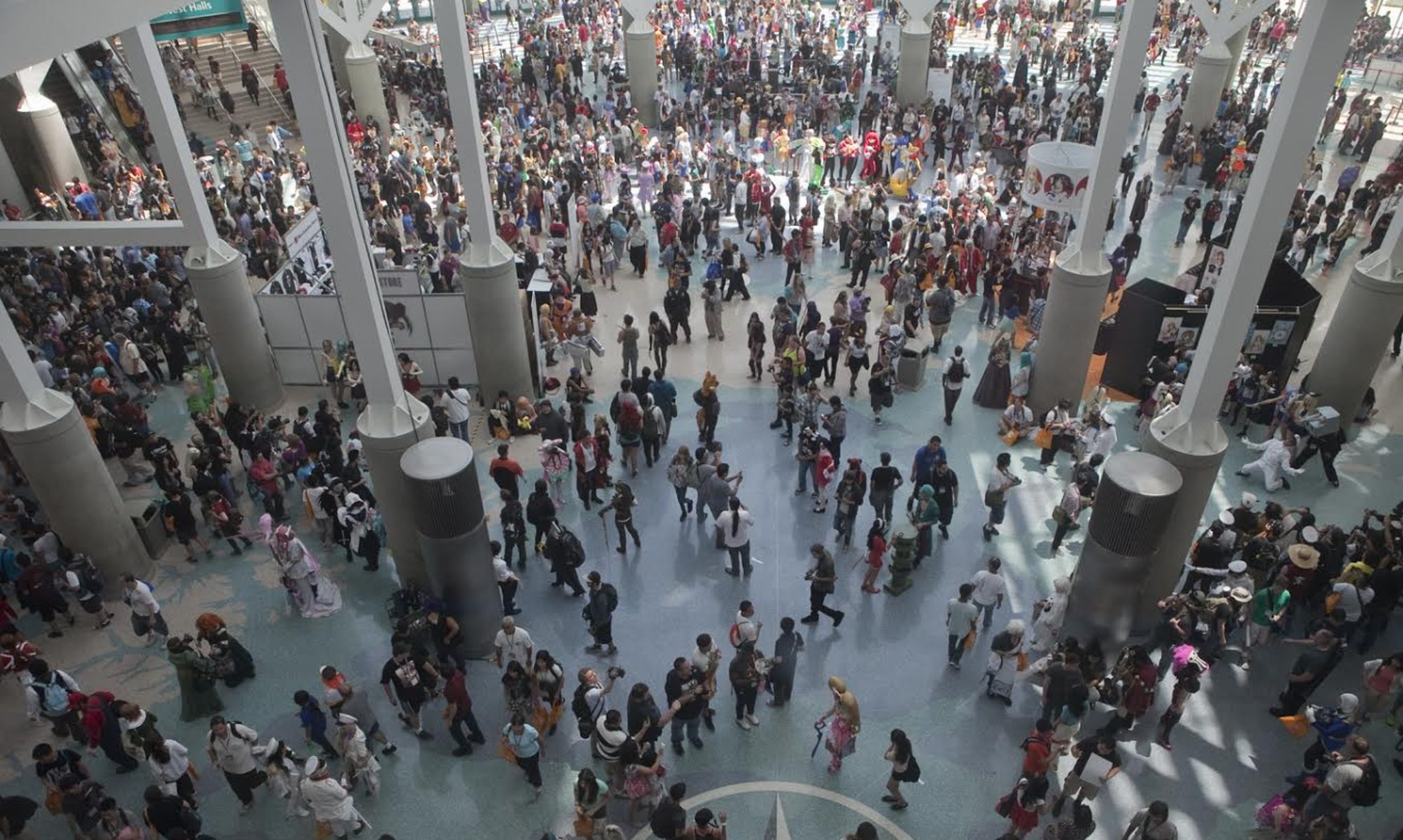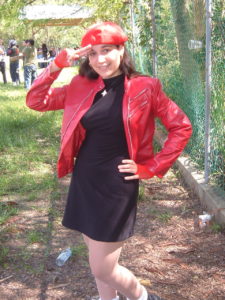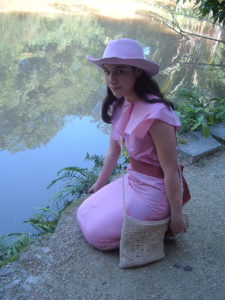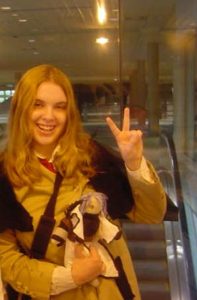Age: 30
Location: New Brunswick, New Jersey
When did you discover anime? Share as much as you remember. If I really think about it, the first anime I ever saw were the likes of Voltron, but I obviously didn’t know that it was originally anime back in the late ’80s. I also had a Captain Power VHS tape as a kid that was animated, but didn’t realize it was “anime” until much later.
The first time I really understood what I was watching was “anime” was when FoxKids was airing Digimon and Escaflowne, and then when Toonami was airing Rurouni Kenshin and G Gundam. In 2004 I truly went in full bore as a fan with Fullmetal Alchemist.
At first you watched anime not knowing it was anime. How did you learn it was anime, and how did that change your perception of it? While I’m sure I heard the term “anime” here & there during the 90s, I didn’t really identify what anime was until around the time I was watching Toonami. I do remember watching Pokémon as a child & not identifying it as “anime”, and I think during that short time Fox aired its edited version of Escaflowne it did advertise it specifically as “anime”, so I guess I would say that was the exact moment I learned stuff like that was anime.
As for perception, it did add a bit of an extra allure to it, especially when Fox Kids (later FoxBox and 4Kids TV) started focusing more on airing anime than domestic animation. It was honestly a really cool time to get into anime, as I had a bunch of really cool series to watch, like more Digimon, Dinozaurs, Flint the Time Detective, Monster Rancher, Ultimate Muscle, Shaman King, and even a little tokusatsu in the form of dubbed Ultraman Tiga. Alongside Toonami, anime was being given this special feeling, as though it was something that most domestic animated series just didn’t focus on being. It was to the point where, I’ll admit, I was one of those “Anime isn’t a cartoon” kind of fan, but eventually I grew up and realized that separation like that is pointless.
What appealed to you about anime when you first discovered it? It was so different from what was being made here in North America. Even as a kid, when I saw Digimon, I could tell that it was doing things in a way that I had not seen before with animated television. As I became more and more of a fan, I also discovered my favorite appeal: Anime can truly be about anything.
Could you elaborate? Remember the old ad slogan of “There’s an app for that”? That same concept applies to anime, which is something you really can’t say about animation anywhere else in the world. Ever since I started really getting into anime and manga, I’ve seen, read, or even simply heard of stories about firefighting, wine tasting, basketball, baseball, boxing, American football, soccer, golfing, bread baking, Chinese cuisine, mahjong, go, card games, yo-yos, pachislot, kyotei racing, car racing, cleaning up space garbage, vikings, all manner of world history (not just Japanese), atomic bomb survivors, adapting classic literature (including even the Bible), teaching, poetry, even fictional butt and breast combat, among many others. Plus, this is all alongside the stereotypical stories of ninjas, samurai, swords and sorcery, giant robots, space wars, romances, comedies, and the like. I don’t even have to be initially interested in any of these subjects in order to enjoy them, because they are just well told stories with great characters and heart-felt emotion; I’m not into sports normally, for example, but I have no qualms with watching a sports anime. If you can think of a subject, you can probably be told “There’s an anime/manga for that”, and I don’t think you can honestly say that about any other country’s animation industry. More than anything, what I love the most about anime is that the Japanese are willing to tell a story using anything they can think of, which in turn creates a catalog so diverse that I may never stop being amazed at what comes from it.
What would you say was the most popular anime at the time? Without a doubt, Fullmetal Alchemist. Even someone who doesn’t really follow the general crowd just had to watch FMA, & it was the anime that truly got me to become a fan of the medium in general.
Why did Fullmetal Alchemist resonate with you like no other show before? Admittedly, the main reason I even gave FMA a try in the first place was because I had first heard of it through the video game tie-ins, which lead to me finding out about FUNimation licensing it… Yes, I watched fansubs because it got licensed; everyone had their moments of idiocy back when they were younger. Regardless, once I started watching I was hooked, and it was simply because, even compared to the other anime I has seen prior to it (either on TV or the boxset or two I had bought before then), it was very different. Ed and Al Elric’s journey to regain their missing bits of humanity just felt so tonally different from the Digimons, Arc the Lads, and G Gundams I had seen before. The story was outstanding, the characters instantly memorable, the action thrilling, and overall it just truly, finally, made me want to be a fan of anime in a more definitive & focused way, rather than the fan-on-the-side that I was before FMA.
What was it like to be a part of anime fandom at the time? At the time, digital fansubs were the big thing, so it was a little wild and crazy at times. Multiple groups were doing the same shows, with varying levels of accuracy, style, and polish, and that resulted in most people preferring some groups over others. The end result was either prioritizing speed (for those who wanted it yesterday) or coming out a little later, but with a more polished & natural translation.
Was the Internet a part of fandom at the time? If yes, how? If no, how did you connect with other fans? I quickly joined the AnimeOnDVD.com forums, now known as The Fandom Post forums, and it was a wild time. There was such a strong focus on not just what titles were being brought over, but also on how well done the DVDs were on a highly technical level. Admittedly, I didn’t quite relate to them on the same exact level, but the passion was still there between all of us (both on a good level, as well as a not-so-good level).
How did you express your fandom early on? For a good number of years, I was simply content with watching anime and participating in forum talk over at AnimeonDVD.com. When Chris Beveridge sold the site to Mania.com, a blog section came with the updated forums, and over there I did start writing some pieces on all sorts of stuff, usually regarding anime or gaming; the Mania forums are now long gone, but that proto-blog wasn’t anything special. After I graduated from Rutgers in 2009, though, I started up a YouTube channel, where I reviewed various video games and smaller name anime. To be honest, I put next to no effort in any of those videos, especially from a production standpoint, though I somehow got props and positive feedback from them; I still can’t explain that. After a year of that, I finally decided to start up a proper blog, one where I could actually use my college-educated writing skills and deliver much more detailed and free form reviews for anime that have been forgotten or simply never talked about before. That wound up becoming The Land of Obscusion, and I’ve been doing that for over six years now.
And, really, the blog is simply a more focused and expressive form of my fandom, as I’ve always aimed more on watching what others are NOT talking about. It’s been like that since I truly got into anime (I didn’t move on to Evangelion or Cowboy Bebop after FMA, but rather I watched Ragnarok the Animation, Tokyo Underground, & Tales of Eternia the Animation), & it’s how I operate to this very day.
Do you remember your first convention? What was it, and what was it like?
My first convention was Otakon 2006, and all me and my friends did during the entire thing was buy tons of manga (and some anime) from the dealer’s room. Looking back on it now, I wonder how exactly we seemingly spent a three-day weekend simply buying manga, and we all bought a metric ton of it. Some of it was great & some of it was crap, but we were hungry for manga & just wanted more to read. Still, I did wish that we actually checked out more of the con, which we started doing from the next year on.
Your first Otakon you spent buying stuff. What about the next year? While I loved having such a large amount of manga to read while on the bus I used to get around Rutgers at the time, I quickly understood that there was an entire convention that I missed out on. From the second year on, I made more of an effort to experience more of what Otakon had to offer. In 2007 I attended some panels and checked out some of the video rooms, alongside perusing the dealer’s room. In 2008 my friends and I went to the JAM Project concert and had the time of our lives, while also doing more of what we did the year prior. Today, I am much more of a panel attendee, and have even moved on to running my own panels. My Otakon experiences have more or less mirrored my evolution as an anime fan, starting as a simple devourer of content before becoming one who wishes to learn more, and now being someone who wishes to show others.
What’s the biggest contrast between anime fandom then and anime fandom today? Easily the biggest contrast is the overall changing of the guard and a general relaxation of what makes one a “real fan.” While I didn’t have to deal with “gatekeepers,” like those who started in the old days did, there was still a bit of a hierarchy in the forum culture when I started. There were some people, who will remain nameless, who seemed to take delight in demeaning those who didn’t follow their “superior” tastes and preferences over at the old AnimeonDVD.com forums (and this also followed through to Mania to an extent), and it was primarily because they were giant fans of what was selling (and getting licensed) the most at the time; they truly felt that they were better (i.e. more of a “real fan”) than others for such petty reasons.
Today, however, the concept of a “real fan” is generally looked at with disdain, and that makes me happy. Nowadays, we get ~95% of everything anime that gets made, which in turn allows a person to be a fan to whatever extent or form he or she wants. You can be a guy who follows the newest stuff religiously, you can be a gal who waits until something finishes before checking it out, you can be someone who enjoys what others may not, you can stick with only watching a show or two at a time, you can watch something for the hope of seeing beautifully fluid animation, or you can be a weirdo like me who purposefully watches the stuff barely anyone else does, and the best part of all is that all of them are now considered “anime fans” equally. People can be as “real” as they want to be today, and I only wish it was like that back in the mid-00s.




